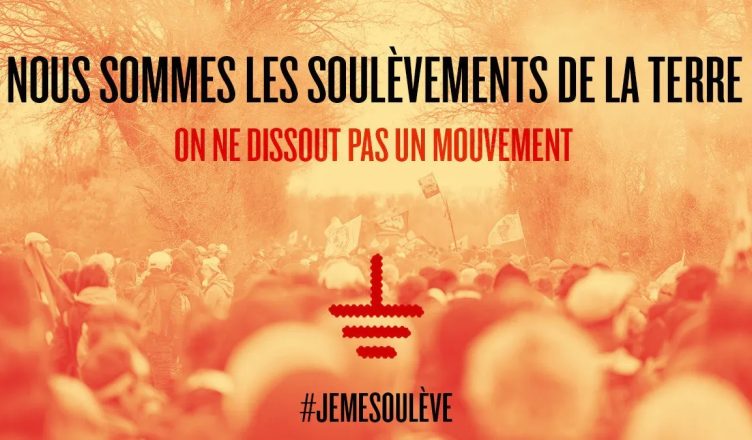In late May a mass blockade of the A12 in the Hague in the Netherlands by 6,000 people ended with 1,500 arrests. The police used water cannons against the crowd fifteen minutes after the blockade began. Protestors were picked up bodily, put into buses and transported to a nearby football stadium. Most of these were released shortly after, but forty were detained for a whole day without food or water. These were held in a police bus and harshly interrogated. One was held for three days, accused of biting a cop but no evidence was offered and they were acquitted a week later.
The blockade was called by Dutch Extinction Rebellion who were demanding that their government end fossil fuel subsidies. This is not the first time police have used repressive tactics against environmentalists. In January police made pre-emptive arrests of protestors before a similar blockade in January. This led to a mass wave of indignation against these arrests.
In France environmental protestors demonstrated against the building of a high-speed train line between Lyon and Turin in France on Saturday, June 17th. They regard the line as highly harmful to the environment and negatively affecting water resources in the region. More than 4,000 demonstrated at the village of La Chapelle. The cops fired tear gas at the protestors. Twenty-seven protestors from Italy were detained by French cops and handed back to the Italian police.
The Prefect of Savoie had forbidden demonstrations in seven municipalities close to the French Alps. The demonstration was co-organized by a dozen organisations including Soulèvements de la Terre (“Earth Uprisings”) and the Italian group No-TAV (“No the high-speed train”), which has been opposed to the scheme for some 30 years.
On Tuesday June 20th cops, including members of the Anti-Terrorist Sub Directorate (SDAT) raided homes of Earth Uprisings members in different parts of France and arrested fourteen people. They face charges of ”criminal association” and “organised destruction” related to an invasion of a cement factory in December 2022. Lafarge-Holcim, who own this factory, are one of the biggest producers of CO2 in France. Local people have complained for a long time about the ovens there, fuelled by industrial waste and car tyres, polluting the atmosphere. Earth Uprisings later demonstrated at Sainte Soline in western France against the construction of giant water basins, also seen as environmentally damaging, in March. 30,000 demonstrators turned out. The State responded by turning out 3,200 cops and ten helicopters. Four thousand blast grenades were fired at demonstrators, and the cops also used water cannon, and surrounded the site with trucks. Two protestors ended up in comas, and the most seriously injured of these, who was in a life-threatening condition for some time, is only now showing signs of recovery. The Human Rights League (FDH) stated that “as soon as the demonstrators arrived at the reservoir site, police fired at them with weapons of war: tear gas grenades, stun grenades, explosive sting-ball grenades and rubber bullets”.
On Wednesday June 20th, a cabinet meeting of the Macron government confirmed that it had ordered the dissolution of Earth Uprisings, in other words banning it and making it illegal. This is an extremely disturbing move, with the use of a law previously deployed against Islamists and the far-right.
Repressive measures are also being used against protestors in the the UK. When two members of Just Stop Oil unfurled a banner on a London bridge, causing it to be closed for 36 hours, they subsequently spent the next six months in custody, before being sentenced under a new law that is specifically aimed at disruptive protests. This law was pushed by Boris Johnson when he was PM, and could see protestors potentially facing up to ten years in jail. The sentencing judge made it clear in his closing statement that the sentences were meted out as punishment and to deter others from taking similar action.
Morgan Trowland received a harsh three-year prison sentence, whilst Marcus Decker got two years and seven months in jail.
This follows sentencing of up to six months for Insulate Britain protestors, with others narrowly avoiding similar sentences. Intelligence on environmental protesters who specifically target large companies is being passed to counter-terror police (CTP) to see if their activity could “indicate a path towards terrorism”.
Public order and protest-related duties were removed from CTP’s remit in April 2020. But documents obtained under the Freedom of Information Act show that information on environmental protestors is still being shared with CTP HQ, a department run by the Metropolitan police which oversees a national counter-terror network, including on the grounds that it could cause “large-value loss” to a business. When she was Home Secretary, Priti Patel was to label Extinction Rebellion activists as “eco-crusaders turned criminals”.
In different states in Australia, similar repressive laws have been passed against environmental protestors, with those taking part in peaceful protests facing the same sentencing as for aggravated assault.
Everywhere the State and the boss class is responding to attempts to halt climate change and environmental damage, seen as affecting profit, with vicious State violence and harsh sentencing. This reveals their real concerns. Whilst they come out with mealy mouthed statements on the environment, they are prepared to do nothing to halt the juggernaut of climate change. On the contrary, they are ready to turn to the State thugs and mercenaries of the police and to compliant judges, to halt the ever-growing environmental movements around the world.
At the moment this is illustrated most clearly in France, where an increasingly militarised police is being used against environmental protestors. This is the same militarised police that is being used against the large-scale protests against pension reforms. The reactions of the State and the media to the environmental movements will inevitably lead to increased radicalisation to sections of that movement, to the growing realisation that the halting of climate change cannot happen without system change, the dismantling of capitalism that must include the dissolution of the police.

